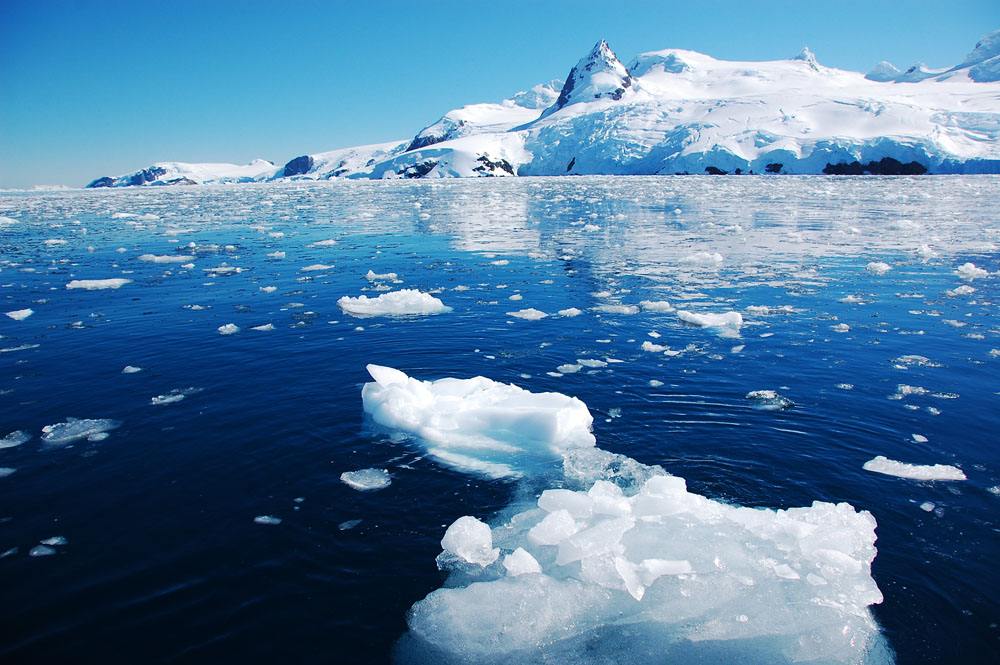(单词翻译:单击)
听力文本
This is Scientific American — 60-Second Science. I'm Julia Rosen.
Got a minute?
Last Christmas, Santa Claus must have been loading his sleigh in a t-shirt and shorts. Temperatures at the North Pole crept up toward the freezing point when they should have been minus twenty Fahrenheit.
The heat wave was the latest in a series that have swept over the Arctic in recent winters. Climate change has caused steady warming in the region. But it has also helped supercharge these extreme events, which scientists say are tied to storms that spiral north out of the Atlantic.
"These winds actually pick up a lot of heat and moisture."
Vladimir Alexeev, a climate scientist at the University of Alaska Fairbanks.
"And the atmosphere carries all this extra moisture and heat to the central Arctic, which results in [a] warmer and moister atmosphere."
Which then warms the surface.
Alexeev says the heat ferried north by these storms helps slow the growth of sea ice in winter—causing it to be about 15 centimeters thinner by the end of the season. And thinner ice may have a harder time surviving the summer.

But while the impact of these storms has grown in recent decades, the storms themselves are not happening more often, Alexeev says.
"An important piece of information is that the frequency of those storms is not changing. What's changing is the area of open water in those regions."
As the Atlantic Ocean has warmed up, the amount of sea ice around Scandinavia and Siberia in winter has decreased. So now, instead of passing over an ice-capped ocean, storms blow over larger areas of open water on their way north. And that gives them a chance to pick up more heat and moisture from the sea that they carry into the Arctic, causing stronger heat waves.
Alexeev presented his results in December at the Fall Meeting of the American Geophysical Union in San Francisco.
Another study by Kent Moore, an atmospheric physicist at the University of Toronto, came out around the same time as the meeting and also linked the heat waves to storms passing over more and more open water. That research is in the journal Scientific Reports.
Alexeev says the situation could be an example of what scientists call a positive feedback: warming causes the loss of sea ice, which promotes more warming and even more ice loss. In other words, it's a snowball effect—or in this case, an anti-snowball effect.
Thanks for the minute for Scientific American — 60-Second Science Science. I'm Julia Rosen.
参考译文
这里是科学美国人——60秒科学。我是朱莉娅·罗森。
有一分钟时间吗?
去年圣诞节,圣诞老人一定是穿着T恤和短裤往雪橇上装礼物。北极点的温度攀升至冰点,而正常温度应该是零下二十华氏度。
这是席卷北极的最新一股热浪,而最近几个冬季北极一直饱受热浪的困扰。气候变化导致该地区持续变暖。同时也导致了一些极端事件的增加,科学家认为这些事件与北大西洋风暴气旋有关。
“这些风实际上携带着很多热量和水分。”
弗拉基米尔·阿列谢夫是阿拉斯加大学费尔班克斯分校的气候学家。
“大气把所有额外的水分和热量带到北极中心,这导致空气变得更温暖湿润。”
然后使地面升温。
阿列谢夫表示,这些风暴使热量向北移动,降低冬季海冰的增长速度,继而导致海冰在冬季结束时的厚度减少约15厘米。变薄的海冰可能很难熬过夏天。
阿列谢夫说,虽然近几十年来这些风暴带来的影响日益增加,风暴本身并没有频繁发生。
“一条重要的信息是,这些风暴的频率没有发生改变。变化的是这些地区开放水域的面积。”
随着大西洋温度升高,斯堪的纳维亚和西伯利亚周围的冬季海冰面积也在缩小。所以现在,风暴在向北移动的过程中,并不是越过被冰雪覆盖的海洋,而是经过大面积的开放水域。这使风暴有机会从海洋获得更多的热量和水分,然后将这些热量和水分带到北极,引发更强的热浪。
阿列谢夫在12月于旧金山举行的美国地球物理学联合会秋季会议上公布了他的研究结果。
肯特·莫尔是多伦多大学的大气物理学家,他也在会议同一时间公布了他的一项研究成果,而这项研究同样认为,热浪的产生是因为风暴经过的开放水域越来越多。该研究结果发表在《科学报告》期刊上。
阿列谢夫说,这种情况可能成为科学家称之为“正反馈”的例证:升温导致海冰减少,海水减少又促进气候变暖和更多的海冰损失。换句话说,这相当于滚雪球效应,其实在这种情况下应该是反滚雪球效应。
谢谢大家收听科学美国人——60秒科学。我是朱莉娅·罗森。
译文为可可英语翻译,未经授权请勿转载!
重点讲解
重点讲解:
1. creep up (比率或数值)逐渐增长;
例句:The inflation rate has been creeping up to 9.5 per cent.
通货膨胀率已攀升至9.5%。
2. result in 导致;引起;造成;
例句:Acting before thinking always results in failure.
做事不先考虑总会导致失败。
3. come out 出版,发行;
例句:He has written two articles for the journal, one to be published in this issue, the other to come out in the next.
他为这家杂志写了两篇稿子,一篇即将在本期发表,另一篇将在下期刊载。
4. in other words 换言之;换句话说;也就是说;
例句:In other words, this kind of question is often a lead-in to a suggestion or invitation.
换言之,这种问题通常是建议或邀请的开场白。


